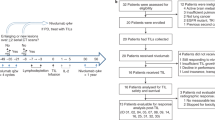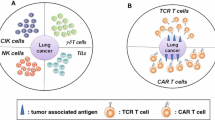Abstract
Adoptive cell therapy (ACT) of tumor infiltration lymphocytes (TIL) yields promising clinical results in metastatic melanoma patients, who failed standard treatments. Due to the fact that metastatic lung cancer has proven to be susceptible to immunotherapy and possesses a high mutation burden, which makes it responsive to T cell attack, we explored the feasibility of TIL ACT in non-small cell lung cancer (NSCLC) patients. Multiple TIL cultures were isolated from tumor specimens of five NSCLC patients undergoing thoracic surgery. We were able to successfully establish TIL cultures by various methods from all patients within an average of 14 days. Fifteen lung TIL cultures were further expanded to treatment levels under good manufacturing practice conditions and functionally and phenotypically characterized. Lung TIL expanded equally well as 103 melanoma TIL obtained from melanoma patients previously treated at our center, and had a similar phenotype regarding PD1, CD28, and 4-1BB expressions, but contained a higher percent of CD4 T cells. Lung carcinoma cell lines were established from three patients of which two possessed TIL cultures with specific in vitro anti-tumor reactivity. Here, we report the successful pre-clinical production of TIL for immunotherapy in the lung cancer setting, which may provide a new treatment modality for patients with metastatic NSCLC. The initiation of a clinical trial is planned for the near future.


Similar content being viewed by others
Abbreviations
- ACT:
-
Adoptive cell therapy
- CM:
-
Complete medium
- REP:
-
Rapid expansion procedure
- TIL:
-
Tumor infiltrating lymphocytes
- TRC:
-
Tissue remnant culture
References
Siegel RL, Miller KD, Jemal A (2016) Cancer statistics, 2016. CA Cancer J Clin 66:7–30. https://doi.org/10.3322/caac.21332
Doebele RC, Oton AB, Peled N, Camidge DR, Bunn PA Jr (2010) New strategies to overcome limitations of reversible EGFR tyrosine kinase inhibitor therapy in non-small cell lung cancer. Lung Cancer 69:1–12. https://doi.org/10.1016/j.lungcan.2009.12.009
Antonia SJ, Vansteenkiste JF, Moon E (2016) Immunotherapy: beyond anti-PD-1 and anti-PD-L1 therapies. Am Soc Clin Oncol Educ Book Am Soc Clin Oncol Meet 35:e450–e458. https://doi.org/10.14694/EDBK_158712
Giri A, Walia SS, Gajra A (2016) Clinical trials investigating immune checkpoint inhibitors in non-small-cell lung cancer. Rev Recent Clin Trials 11:297–305
Mayor M, Yang N, Sterman D, Jones DR, Adusumilli PS (2016) Immunotherapy for non-small cell lung cancer: current concepts and clinical trials. Eur J Cardiothorac Surg 49:1324–1333. https://doi.org/10.1093/ejcts/ezv371
Shin DS, Ribas A (2015) The evolution of checkpoint blockade as a cancer therapy: what’s here, what’s next? Curr Opin Immunol 33:23–35. https://doi.org/10.1016/j.coi.2015.01.006
Horne ZD, Jack R, Gray ZT et al (2011) Increased levels of tumor-infiltrating lymphocytes are associated with improved recurrence-free survival in stage 1A non-small-cell lung cancer. J Surg Res 171:1–5. https://doi.org/10.1016/j.jss.2011.03.068
Kilic A, Landreneau RJ, Luketich JD, Pennathur A, Schuchert MJ (2011) Density of tumor-infiltrating lymphocytes correlates with disease recurrence and survival in patients with large non-small-cell lung cancer tumors. J Surg Res 167:207–210. https://doi.org/10.1016/j.jss.2009.08.029
Lawrence MS, Stojanov P, Polak P et al (2013) Mutational heterogeneity in cancer and the search for new cancer-associated genes. Nature 499:214–218. https://doi.org/10.1038/nature12213
Lu YC, Yao X, Crystal JS et al (2014) Efficient identification of mutated cancer antigens recognized by T cells associated with durable tumor regressions. Clin Cancer Res 20:3401–3410. https://doi.org/10.1158/1078-0432.CCR-14-0433
Robbins PF, Lu YC, El-Gamil M et al (2013) Mining exomic sequencing data to identify mutated antigens recognized by adoptively transferred tumor-reactive T cells. Nat Med 19:747–752. https://doi.org/10.1038/nm.3161
Dudley ME, Wunderlich JR, Yang JC et al (2005) Adoptive cell transfer therapy following non-myeloablative but lymphodepleting chemotherapy for the treatment of patients with refractory metastatic melanoma. J Clin Oncol 23:2346–2357. https://doi.org/10.1200/JCO.2005.00.240
Itzhaki O, Hovav E, Ziporen Y et al. (2011) Establishment and large-scale expansion of minimally cultured “young” tumor infiltrating lymphocytes for adoptive transfer therapy. J Immunother 34:212–220. https://doi.org/10.1097/CJI.0b013e318209c94c
Andersen R, Donia M, Ellebaek E et al (2016) Long-lasting complete responses in patients with metastatic melanoma after adoptive cell therapy with tumor-infiltrating lymphocytes and an attenuated IL2 regimen. Clin Cancer Res 22:3734–3745. https://doi.org/10.1158/1078-0432.CCR-15-1879
Besser MJ, Shapira-Frommer R, Itzhaki O et al (2013) Adoptive transfer of tumor-infiltrating lymphocytes in patients with metastatic melanoma: intent-to-treat analysis and efficacy after failure to prior immunotherapies. Clin Cancer Res 19:4792–4800. https://doi.org/10.1158/1078-0432.CCR-13-0380
Dudley ME, Gross CA, Somerville RP et al (2013) Randomized selection design trial evaluating CD8+-enriched versus unselected tumor-infiltrating lymphocytes for adoptive cell therapy for patients with melanoma. J Clin Oncol 31:2152–2159. https://doi.org/10.1200/JCO.2012.46.6441
Goff SL, Dudley ME, Citrin DE et al (2016) Randomized, prospective evaluation comparing intensity of lymphodepletion before adoptive transfer of tumor-infiltrating lymphocytes for patients with metastatic melanoma. J Clin Oncol 34:2389–2397. https://doi.org/10.1200/JCO.2016.66.7220
Pilon-Thomas S, Kuhn L, Ellwanger S et al. (2012) Efficacy of adoptive cell transfer of tumor-infiltrating lymphocytes after lymphopenia induction for metastatic melanoma. J Immunother 35:615–620. https://doi.org/10.1097/CJI.0b013e31826e8f5f
Radvanyi LG, Bernatchez C, Zhang M et al (2012) Specific lymphocyte subsets predict response to adoptive cell therapy using expanded autologous tumor-infiltrating lymphocytes in metastatic melanoma patients. Clin Cancer Res 18:6758–6770. https://doi.org/10.1158/1078-0432.CCR-12-1177
Ratto GB, Zino P, Mirabelli S et al. (1996) A randomized trial of adoptive immunotherapy with tumor-infiltrating lymphocytes and interleukin-2 versus standard therapy in the postoperative treatment of resected nonsmall cell lung carcinoma. Cancer 78:244–251. https://doi.org/10.1002/(SICI)1097-0142(19960715)78:2<244::AID-CNCR9>3.0.CO;2-L
Jin J, Sabatino M, Somerville R, Wilson JR, Dudley ME, Stroncek DF, Rosenberg SA (2012) Simplified method of the growth of human tumor infiltrating lymphocytes in gas-permeable flasks to numbers needed for patient treatment. J Immunother 35:283–292. https://doi.org/10.1097/CJI.0b013e31824e801f
Seliktar-Ofir S, Merhavi-Shoham E, Itzhaki O et al (2017) Selection of shared and neoantigen reactive T cells for adoptive cell therapy based on CD137 separation. Front Immunol. https://doi.org/10.3389/fimmu.2017.01211
Hinrichs CS, Restifo NP (2013) Reassessing target antigens for adoptive T-cell therapy. Nat Biotechnol 31:999–1008. https://doi.org/10.1038/nbt.2725
Funding
The authors would like to thank Haya and Nehemia Lemelbaum for their generous support.
Author information
Authors and Affiliations
Contributions
RB-A, OI, and MJB designed the study. RB-A, OI, RF, AB-N, MG, and EG acquired the data. RB-A, OI, RF, GM, JS, and MJB analyzed and interpreted the data. All the authors revised the work, approved the final version, and agreed to be accountable of the work.
Corresponding authors
Ethics declarations
Conflict of interest
The authors declare that they have no conflict of interest.
Ethical approval
The protocol was approved by the IRB Committee of the Sheba Medical Center, Israel. Approval number: SMC-0921-13.
Informed consent
Patients signed an informed consent under the approved protocol SMC-0921-13.
Electronic supplementary material
Below is the link to the electronic supplementary material.
Rights and permissions
About this article
Cite this article
Ben-Avi, R., Farhi, R., Ben-Nun, A. et al. Establishment of adoptive cell therapy with tumor infiltrating lymphocytes for non-small cell lung cancer patients. Cancer Immunol Immunother 67, 1221–1230 (2018). https://doi.org/10.1007/s00262-018-2174-4
Received:
Accepted:
Published:
Issue Date:
DOI: https://doi.org/10.1007/s00262-018-2174-4




